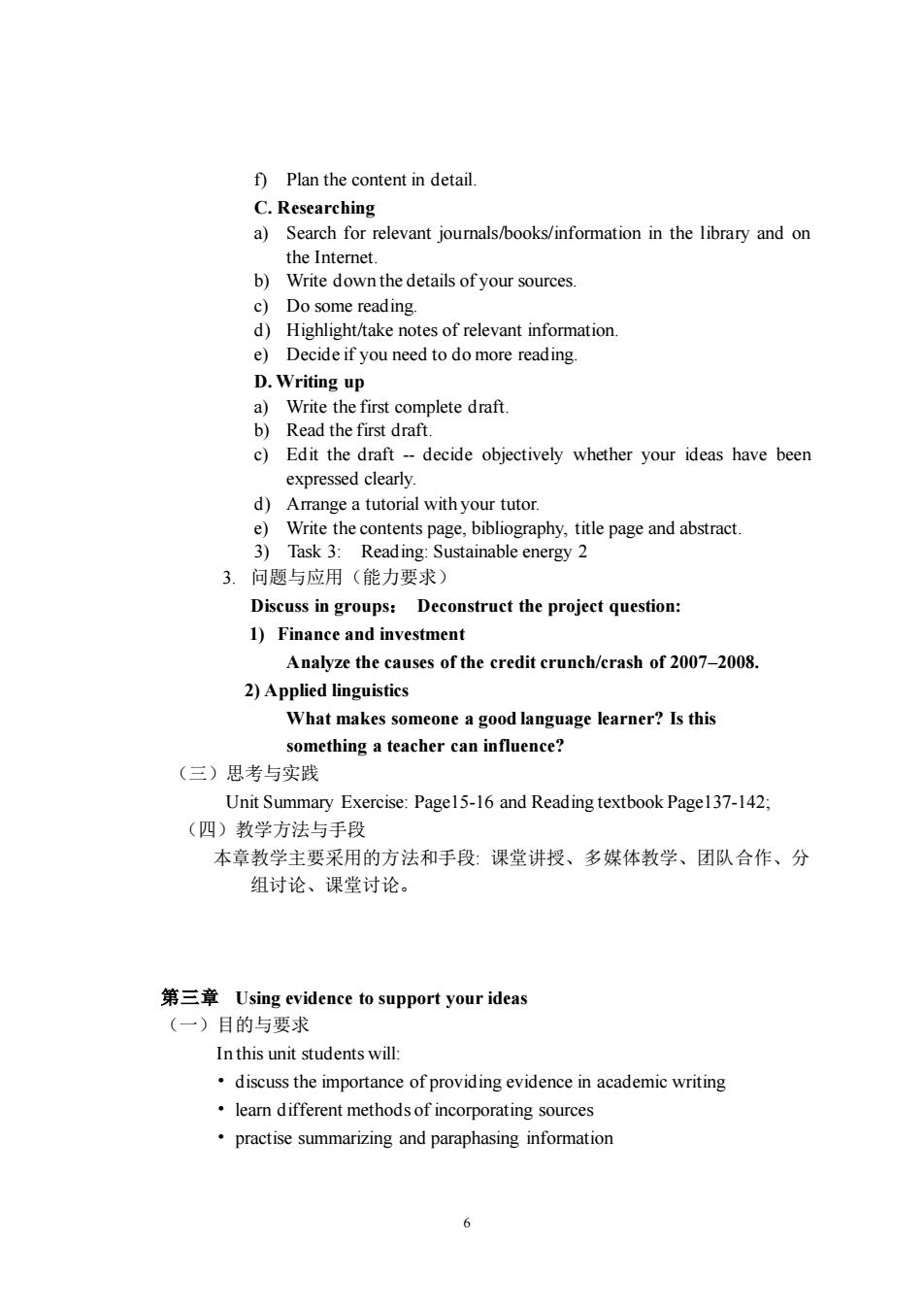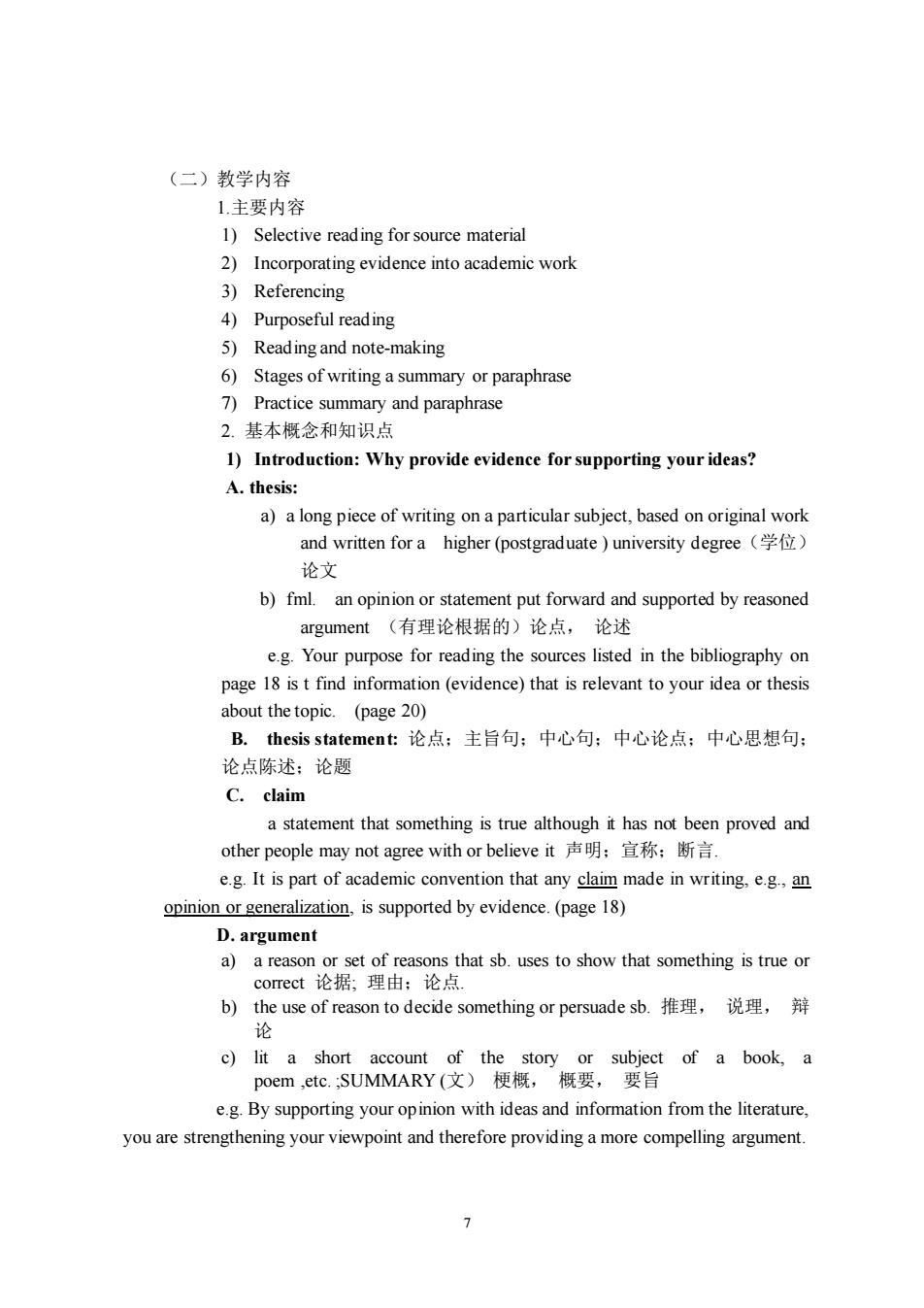
f)Plan the content in detail. C.Researching a)Search for relevant journals/books/information in the library and on the Internet. b)Write down the details of your sources. e reading Highlight/take notes of relevant information. e)Decide if you need to do more reading. D.Writing up Write the complete draft c)Edit the draft--decide objectively whether your ideas have been expressed clearly. d)Arrange a tutorial with your tutor the c ntents page,biblic graphy.title page and abstrac 3)Task 3 eading:Sustainable energy 2 3.问题与应用(能力要求) Discuss in groups:Deconstruct the project question: 1)Finance and investment Analyze the causes of the credit crunch/crash of 2007-2008 2)Applied linguistics What makes someone a good language learner?Is this something a teacher can influence? (三)思考与实践 Unit Summary Exercise:Pagel5-16 and Reading textbook Pagel37-142: (四)教学方法与手段 本章教学主要采用的方法和手段:课堂讲授、多媒体教学、团队合作、分 组讨论、课堂讨论。 第三章Using evidence to support your ideas (一)目的与要求 In this unit students will: .discuss the importance of providing evidence in academic writing leamn different methods of incorporating sources practise summarizing and paraphasing informatio 6
6 f) Plan the content in detail. C. Researching a) Search for relevant journals/books/information in the library and on the Internet. b) Write down the details of your sources. c) Do some reading. d) Highlight/take notes of relevant information. e) Decide if you need to do more reading. D. Writing up a) Write the first complete draft. b) Read the first draft. c) Edit the draft -- decide objectively whether your ideas have been expressed clearly. d) Arrange a tutorial with your tutor. e) Write the contents page, bibliography, title page and abstract. 3) Task 3: Reading: Sustainable energy 2 3. 问题与应用(能力要求) Discuss in groups: Deconstruct the project question: 1) Finance and investment Analyze the causes of the credit crunch/crash of 2007–2008. 2) Applied linguistics What makes someone a good language learner? Is this something a teacher can influence? (三)思考与实践 Unit Summary Exercise: Page15-16 and Reading textbook Page137-142; (四)教学方法与手段 本章教学主要采用的方法和手段: 课堂讲授、多媒体教学、团队合作、分 组讨论、课堂讨论。 第三章 Using evidence to support your ideas (一)目的与要求 In this unit students will: • discuss the importance of providing evidence in academic writing • learn different methods of incorporating sources • practise summarizing and paraphasing information

(二)教学内容 1.主要内容 1)Selective reading for source material 2)Incorporating evidence into academic work 3)Referencing 4)Purposeful reading 5)Reading and note-making 6)Stages of writing a summary or paraphrase 7)Practice summary and paraphrase 2.基本概念和知识点 1)Introduction:Why provide evidence for supporting yourideas? A.thesis: a)a long piece of writing on a particular subject,based on original work and written for a higher(postgraduate )university degree ( 论文 b)fml.an opinion or statement put forward and supported by reasoned argument(有理论根据的)论点,论述 e.g.Your purpose for reading the sources listed in the bibliography on page 18 ist find information(evidence)that is relevant to your idea or thesis about the topic.(page 20) B.thesis statement:论点:主旨句:中心句:中心论点:中心思想句: 论点陈述:论题 a statement that something is true although it has not been proved and other people may not agree with or believe it声明:宣称:断言 e.g.It is part of academic convention that any claim made in writing,e.g.,an opinion or generalization,is supported by evidence.(page 18) D.argument 论论 aarea that sb.uses to show that something is true or b)the use of reason to decide something or persuade sb.推理,说理,辩 论 c)lit a shor e.g.By supporting your opinion with ideas and information from the literature, you are strengthening your viewpoint and therefore providing a more compelling argument 7
7 (二)教学内容 1.主要内容 1) Selective reading for source material 2) Incorporating evidence into academic work 3) Referencing 4) Purposeful reading 5) Reading and note-making 6) Stages of writing a summary or paraphrase 7) Practice summary and paraphrase 2. 基本概念和知识点 1) Introduction: Why provide evidence for supporting your ideas? A. thesis: a) a long piece of writing on a particular subject, based on original work and written for a higher (postgraduate ) university degree(学位) 论文 b) fml. an opinion or statement put forward and supported by reasoned argument (有理论根据的)论点, 论述 e.g. Your purpose for reading the sources listed in the bibliography on page 18 is t find information (evidence) that is relevant to your idea or thesis about the topic. (page 20) B. thesis statement: 论点;主旨句;中心句;中心论点;中心思想句; 论点陈述;论题 C. claim a statement that something is true although it has not been proved and other people may not agree with or believe it 声明;宣称;断言. e.g. It is part of academic convention that any claim made in writing, e.g., an opinion or generalization, is supported by evidence. (page 18) D. argument a) a reason or set of reasons that sb. uses to show that something is true or correct 论据; 理由;论点. b) the use of reason to decide something or persuade sb. 推理, 说理, 辩 论 c) lit a short account of the story or subject of a book, a poem ,etc. ;SUMMARY (文) 梗概, 概要, 要旨 e.g. By supporting your opinion with ideas and information from the literature, you are strengthening your viewpoint and therefore providing a more compelling argument